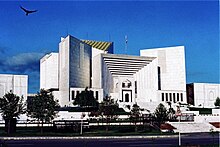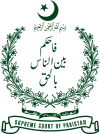|
Saeeduzzaman Siddiqui
 Saeed Uz Zaman Siddiqui (Urdu: سعید الزمان صدیقی; 1 December 1939 – 11 January 2017) (pronunciation 'sa'eed -uz- zam'an'; alternatively / officiallySaiduzzaman Siddiqui) was a Pakistani jurist and legislator of great prominence who formerly served as the 15th Chief Justice of Pakistan and, prior to that, the 7th Chief Justice of the Sindh High Court.[1] At the time of his death, he was serving as the 31st Governor of Sindh. EducationSaeeduzzaman Siddiqui was born in a middle-class, educated Urdu-speaking family and received his school education at Lucknow (in modern Uttar Pradesh) and also was educated at Calcutta. Justice Siddiqui passed Matriculation from the Board of Secondary Education from Dhaka, East Pakistan in 1952. In 1954, Justice Siddiqui obtained intermediate in Engineering sciences from the University of Dacca. Siddiqui worked at the Physics Department, and taught undergraduate physics laboratory courses. Thereafter, Siddiqui moved to Karachi, West-Pakistan and attended Karachi University in 1954. There, at Karachi University, Siddiqui obtained B.A. in Philosophy and L.L.B from the University of Karachi in 1958. In 1960, Justice Siddiqui started legal practice at the Sindh High Court. Justice Siddiqui was awarded honorary membership of the Judicial fraternity of Australia and Canada after the news of his resignation from the office of the Chief Justice was made public in January 2000, after his refusal to take the Oath under the PCO (Provisional Constitutional Order), which was an extra-constitutionally prescribed Oath for the Judges by the military regime of Pervez Musharraf. Saeeduzzaman Siddiqui received a letter of commendation from the Judiciary of the United Kingdom and was inducted in the roles of Judges of eminence by the British Judiciary for his stand in the cause of the independence of Pakistan's Judiciary, his stand was later glorified by the lawyers movement in Pakistan which helped Chief Justice Iftikhar Chaudhary's restoration. CareerJoining the Bar and Sindh High CourtJustice Saeeduzzaman joined the Bar in February 1961. He enrolled as Advocate of High Court of West Pakistan in November 1963, and enrolled as Advocate of Supreme Court of Pakistan in November 1969). He was elected Joint Secretary of Karachi High Court Bar Association in 1967. He was elected Member of Managing Committee of Karachi High Court Bar Association for the year 1968–69. In 1977, he was elected Honorary Secretary of High Court Bar Library and continued as such until begin elevated as a Judge of Sindh High Court on 5 May 1980. He was appointed Chief Justice of the Sindh High Court on 5 November 1990 and as Judge of Supreme Court of Pakistan on 23 May 1992. Chief Justice of PakistanHe was appointed the Chief Justice of Pakistan/Chairman Pakistan Law Commission w.e.f. 1 July 1999 till 1 December 2005. He was the Chief Justice of Pakistan when the 1999 military coup d'état was staged by then-Chairman of the Joint Chiefs of Staff Committee and Chief of Army Staff General Pervez Musharraf. Notably, he defied the request given by Musharraf via the Law Minister and Legal Adviser Sharifuddin Pirzada to take a new oath under the Provisional Constitutional Order (PCO) saying that: "Taking an oath under the PCO, in my opinion, will be a deviation from the oath I had taken to defend the constitution of 1973". The PCO not only negated the independence of the judiciary and democratic norms, but also prolonged the martial law by nullifying the effect of any judgement given against President Pervez Musharraf's government. Post-retirementAs a consequence of this, he was forced to step down from his position by the military regime. His tenure time period was shortened due to his refusal to take the Provisional Constitutional Order (PCO) Oath, prescribed by General Pervez Musharraf to legitimize the Legal Framework Order, 2002. After a long discussion with the four Army generals sent to his residence by General Musharraf; namely, Lieutenant-General (Retired) Moinuddin Haider, who was Interior Minister, then-Lieutenant-General Ehsan ul Haq, Core-commander of the XI Corps, Lieutenant-General (retired) Mahmud Ahmed, then-Director General of the ISI and Brigadier-General (retired) Javed Ashraf Bajwa; Chief Justice Siddiqui refused to take the Oath after which the Generals left. On the orders of GHQ he, along with his family were put into house arrest. On 25 August 2008, Nawaz Sharif announced that Saeeduzzaman Siddiqui would be Pakistan Muslim League (N) and Jamaat-e-Islami nominee to replace Pervez Musharraf as President of Pakistan.[2] He lost the 6 September 2008 Pakistani presidential election, by 153 votes to Asif Ali Zardari, who was elected President of Pakistan.[3][4] The PML-N although in power wanted Siddiqui as a unanimous candidate as he was the only nonpartisan candidate contesting this election of 2008. Justice Siddiqui was again selected for running as the candidate in the 2013 Pakistani presidential election, but at the last moment his name was replaced by Mamnoon Hussain as Siddiqui never joined the PML-N and was a neutral candidate.[5] He was supported by Baloch nationalists.[6] Governor of SindhOn 9 November 2016, Nawaz Sharif contacted Justice Siddiqui and asked him to accept the position of the Governor, in the wake of event which followed the dismissal of Dr. Ishratul Ibad Khan. Justice Siddiqui was sworn in as the 31st Governor of Sindh on 11 November 2016. He died in office exactly two months later. Appointments
Activities
Illness and deathSiddiqui contracted pneumonia and was hospitalised in early November 2016. He returned to the Governor House on 11 December 2016 and died on 11 January 2017 as a serving governor when he contracted another pneumonia on his healthy right lung. His state funeral was organised in the Governor House, making him the second person in the history of the country to receive a state funeral after Muhammad Ali Jinnah, the founder of Pakistan. He was 77.[7][8][9] In 2018, Siddiqui was posthumously awarded the Sitara-i-Imtiaz - Pakistan's third highest civilian honour - by President Mamnoon Hussain.[10] See also
References
|
||||||||||||||||||||||||||||||||||||||||||||||||||||||



